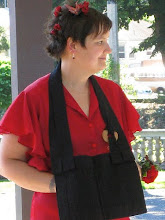Experience the intimacy of things. Do not defile the Three Treasures.I find the precepts to have moments of clarity, times where I think it they are obvious and then suddenly I'm finding layers of where I don't apply them. When I first sat with this precept my mind immediately jumped to insisting that I'd never "defile" the Three Treasures. That other bit though, experiencing intimacy...
The intimacy of the Dharma, that's part of what draws me to Buddhism. It isn't just some words written down by people hundreds of years after some guy said them. It is the collected teachings from the historical Buddha,
Shakyamuni, to the teachers we have now. Considering, applying wisdom and compassion, and most importantly to me, a growing, living thing. There is an approach with the Dharma that reminds me of the way a scientific theory is considered, tested, discussed, tested, and considered some more. If anything, I think I can too easily sink into isolated intimacy of the Dharma without ever touching the other of Treasures.
The intimacy of the Buddha, of falling back into the 10,000 arms of
Avalokiteshvara and knowing with certainty I'll be caught? This is pretty scary stuff for me. I don't fall back on my own easily and the Loving-Kindness sesshin certainly felt like one hell of a shove at times. During the Grasses, Trees & the Great Earth I think I got a little taste of actually letting go, allowing the feeling that my entire soul was exhausted just press me down into the warm floor of the cedar grove.
The intimacy of the Sangha is the most terrifying of them all to me. Having moved so often as a child and having had such a dysfunctional, rejecting family I really don't feel like I know how to belong to a group. For quite some time I came to zazen with the community and fled immediately after sitting was done. I enjoyed that I could come, sit in the depth of shared, communal silence, and not have to talk to anyone at all. Early on the ability to "sit and run" (as a Dharma sister names it) was part of the appeal of Zen.
Yet here it is, nearly 4 years later and next week I'm going to stand up in front of people next week, of my community, and take the vows of Jukai. I've even joined a practice group for women on Monday evenings, giving myself some structure while CK is taking a woodworking class, and shoving myself into a scary place - the close company of a group of women. We met for the first time this Monday evening.
As I talked about why I came (essentially because I was afraid of it) I could hear my voice speed up with the anxiety I was experiencing acutely and could feel my face & ears grow hot. I tried not to listen to my Inner Critic, tried to just stay with the way anxiety feels in my body, and when the next person began to speak kept my attention focused on her, not giving into the rather desperate urge to evaluate, judge, and criticize what I had shared. It feels like progress.



